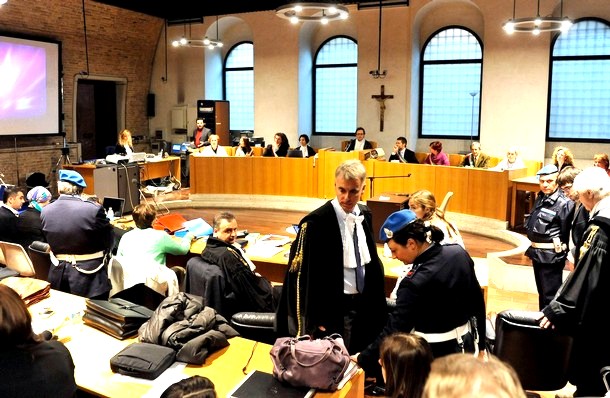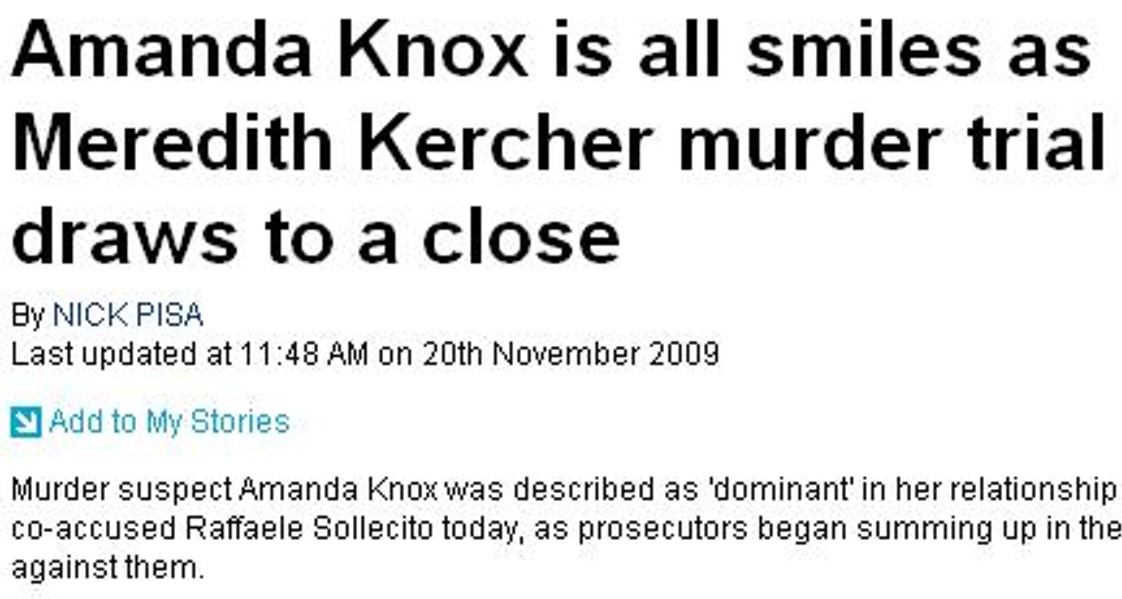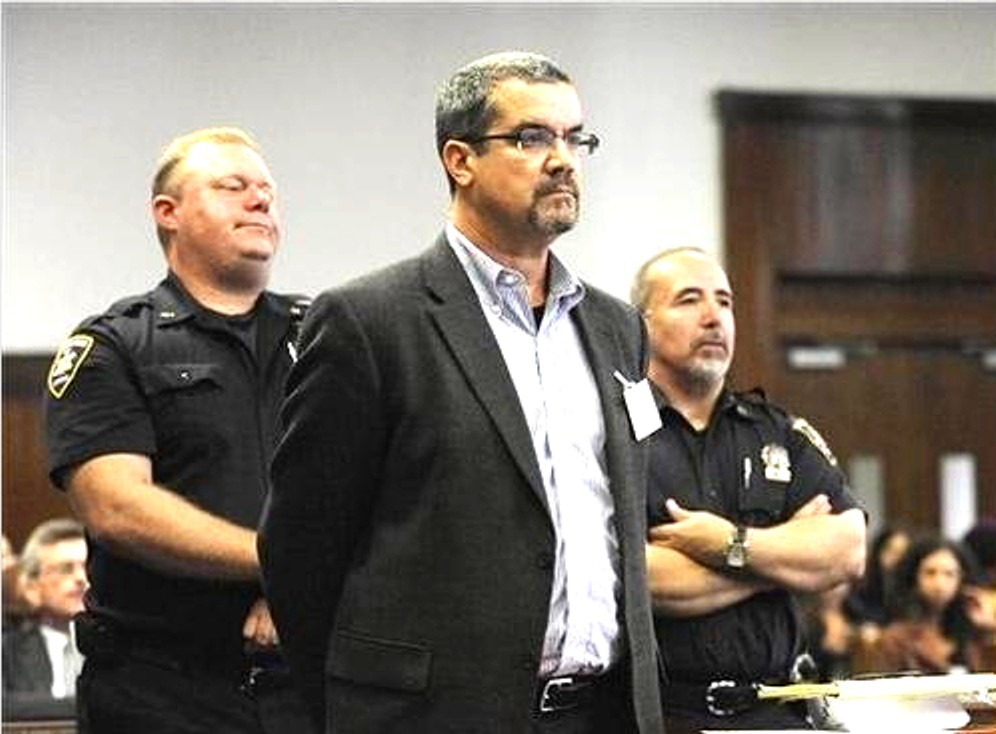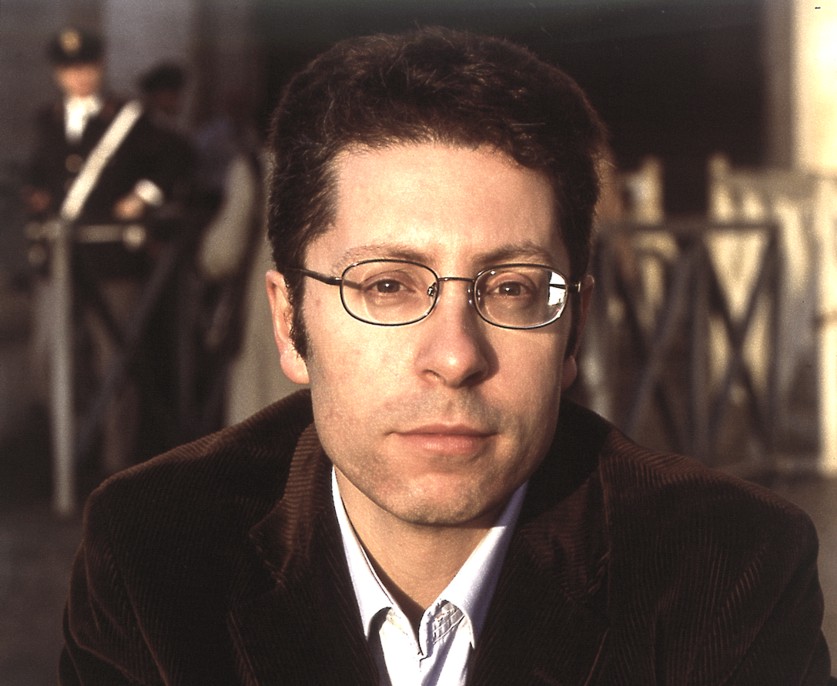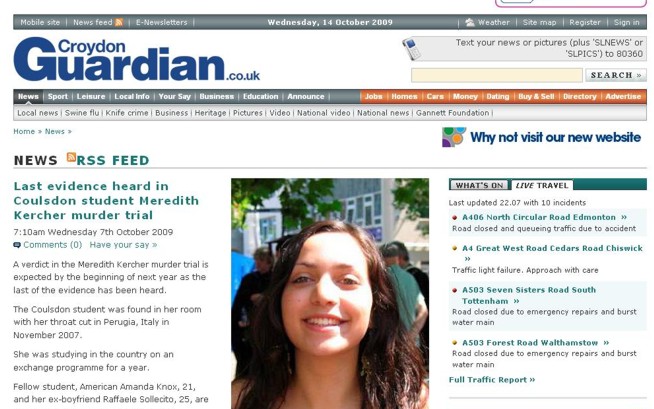
Category: News media & movies
Tuesday, December 01, 2009
Andrea Vogt Asks Some Useful Questions Concerning The Legal Process
Posted by Peter Quennell
Click here to read all of this well-researched report on the Seattle P-I website.
After presenting an overview of the system similar to those posted here by Nicki and Commisario Montalbano Andrea Vogt asks two experts on the system these questions.
Do jurors have to find Knox guilty beyond a reasonable doubt?
Yes. The concept of proof beyond a reasonable doubt has long been a part of Italy’s justice system. It was formalized and passed into law in 2006.
Knox’s defense lawyer Luciano Ghirga said his team will remind jurors that, even after more than 40 hearings, everything is still in doubt.
The court’s ruling (which is not called a verdict in Italy) is made by an eight-member jury: six laymen and two professional judges. They will vote, and the majority rules. In the case of a 4-4 tie, acquittal overrules.
Could Amanda Knox have plea bargained?
Knox maintains her innocence.
However, while not completely analogous to plea bargaining, Italy does have a similar alternative to trial, also a part of the 1988 reforms. The alternative is not applicable for serious crimes, such as murder, punishable by more than five years in prison.
Suspects who cooperate fully with the police, however, may become eligible for a bundle of mitigating circumstances that would lower prison sentences. A judge may also choose to apply aggravating circumstances to increase a sentence.
Negotiation on the evidence—in which both sides agree what can be admitted—is also available when defendants choose a fast-track trial, as did Rudy Guede, sentenced to 30 years last year for his role in the case for which Knox is on trial. Guede is appealing his conviction.
Why does the figure of prosecutor seem so powerful in Italy?
The prosecutor is a powerful figure in Italy connected to the judiciary, not elected or appointed. While there is a career separation between judges and prosecutors, the qualifying examination and training are common, That has made judges and prosecutors close both culturally and professionally.
In the U.S., prosecutors are appointed in federal system and typically elected in the state system, hence it is common to hear cases referred to as The State vs. X.
In Italy, protections were put in place precisely to prevent the state from pursuing or persecuting, hence the independence of prosecutors.
As a result, prosecutors haven’t shied away from taking on politicians. Italian Premier Silvio Berlusconi, for example, faces a series of criminal procedures in the courts.
That independence , some argue, is precisely the protection needed as a check against government power, and without it, corruption could not be exposed, said Maffei. But others argue that prosecutors wage their own political battles. using their independence to attack political opponents.
Another major difference: the prosecutor supervises the investigation rather than letting police handle it.
Further, he or she also has no discretion over the decision to seek charges. There is a constitutional principle of mandatory prosecution. If there is sufficient evidence to build a case against a defendant, a prosecutor must seek an indictment.
In the U.S. prosecutors can and do drop cases for such reasons as workload or because the defendant has agreed to help with a criminal investigation.
Was it legal for Knox not to have an attorney present when police questioned her?
Yes and No.
Amanda Knox’s interrogation falls into a gray area of the law because she came voluntarily to the police station and was being interviewed in the beginning as someone who could become be a witness, not a suspect.
Then, in the course of questioning by police in November 2007, she blamed Patrick Lumumba for the slaying, and said she was present at the scene of the crime. Lumumba was innocent. Knox has since denied she knows anything about the slaying and says she wasn’t in the flat the night Kercher was killed. Limumba is suing Knox for slander.
The law is very clear: A suspect must not be interrogated without a lawyer.
Once a suspect, an interrogation must be interrupted, the suspect read his or her rights to remain silent and be provided a lawyer. Italian law does not allow waiver of one’s right to counsel. Even if a suspect doesn’t want a lawyer, the authorities are required to appoint one.
If a suspect’s freedom of movement is hindered, the interrogation must be videotaped.
In Knox’s case, a video or audio recording of the entire police interrogation (authorities have denied that any such recordings exist) could identify when police began treating Knox as a suspect and what procedures were followed.
In fact, Italy’s Supreme Court has already said that some of her early statements may not be used against her because they were made without an attorney present.
Monday, November 30, 2009
The Summations: Nick Pisa Sums Up Sollecito Lawyer’s Remarks About Knox DRAFT
Posted by Peter Quennell
Tuesday, November 24, 2009
Italians Have For A Long Time Known How Depraved And Cruel The Final Struggle Was
Posted by Our Main Posters
An Exceptionally Vicious Attack
As you can see in the prosecutors’ scenario posted below, we did not translate and post quite everything.
Meredith’s final 15-minute death-struggle is not there.
Back in January of this year the Micheli Report described in great detail Meredith’s autopsy, the wounds on her body, and the horrific state of her room.
Please click here for more
Saturday, November 21, 2009
The Summations: Barbie Nadeau On Mr Mignini Setting Out The Attack Scenario
Posted by Peter Quennell
Click above for Rome-based Barbie Nadeau’s report from the courtroom. Her excellent description includes this sad passage on Meredith.
Then he described Kercher as a woman full of life and potential, “the young woman we too often forget.” Mignini quoted Kercher’s father John on a number of occasions, especially when explaining that she was a strong woman who practiced karate and who would have fought back against an attack.
The courtroom was silent as he recalled the words of Kercher’s father: “Meredith would have fought with all her life.”
The report also includes this on possible hard drugs.
He also hinted that Knox and Sollecito might have been in a drug-fueled frenzy when they allegedly killed Kercher. He outlined the effects of cocaine and acid, and told the judges and jury how Knox and Sollecito ran with a crowd that often used these “stupificante,” or stupefying drugs.
Drugs were not proven other than that both Knox and Sollecito claimed to have smoked marijuana on the day. The two drugs mainly hypothesized up to now if there was a drug other than unmodified marijuana (cannabis) seem to have been crystal meth and skunk cannabis.
Both of them are now proving a cause of psychotic episodes which can result in fatal attacks. Genetically-engineered skunk cannabis seems to increasingly be most of the cannabis on the market.
Friday, November 20, 2009
The Summations: Nick Pisa In Daily Mail Has A Late-Morning Report
Posted by Peter Quennell
Please click above for Nick Pisa’s full story. Two key claims made by the prosecution:
Murder suspect Amanda Knox was described as ‘dominant’ in her relationship with co-accused Raffaele Sollecito today, as prosecutors began summing up in the case against them.
Prosecutor Giuliano Mignini said Knox ‘dominated’ her relationship with Sollecito who in turn was ‘dependent on her’. He said this was evident in TV footage from the time of the murder, where Sollecito was ‘following on behind her, often kissing and cuddling her.’
Prosecutor Mignini added: ‘The key to this mystery is in the room where the supposed break-in took place’. Mignini added: ‘This break-in is the nail of Knox and Sollecito’s defence, but it was all simulated. ‘It would have been manna from heaven for them if blood or other genetic evidence had been found on the broken glass or window frame but nothing was found.”
“This hypothetical thief then did something quite remarkable - he didn’t take anything of value. No jewellery was missing, computers were left at the scene as well as designer bangs and clothes. A “very strange break-in” was in fact how the first police officer who arrived at the house described it - they could not believe that nothing of value was taken.”
Prosecutor Mignini also pointed out how fragments of glass had been found on top of clothes scattered on the bedroom floor which was also unusual for a break-in, especially if the wardrobe had been ransacked after the window was broken.
He added that it was also virtually impossible to climb to the bedroom window of Filomena Romanelli and that it was also the most exposed as it was visible to the road and passing traffic…
Wednesday, November 18, 2009
Rudy Guede Appeal: Nick Pisa Of Sky News Reports DRAFT
Posted by Peter Quennell
[Microsoft’s Internet Explorer Version 8 is having a widely reported problem showing these online Flash videos; other browsers all seem to work fine]
Monday, November 16, 2009
The Actual State Of Play: The Status Now And What Is Coming Up
Posted by Michael
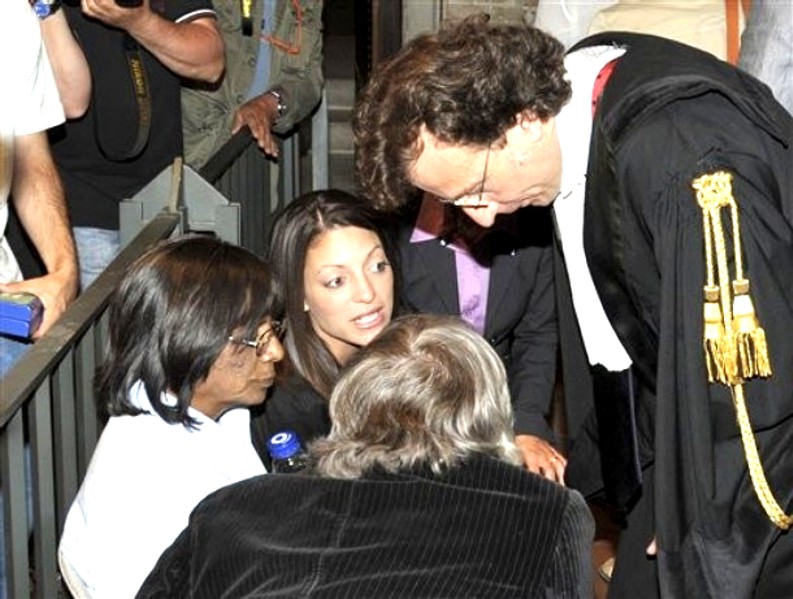
[above: Meredith’s family gets briefed on the proceedings and prospects last June]
The excellent pro-Meredith LA7 documentary that Nicky reported on below would have moved many Italians.
But, apart from some of the claims from Seattle, it is unlikely to have given them many surprises.
Those in Italy have often been able to watch the court proceedings directly, Amanda Knox’s seemingly misconceived stint on the stand included, and the Italian newspapers and networks have done a pretty exemplary job of the reporting. Those there who follow the case will have a highly informed and very accurate understanding of what the evidence points to - that it pretty well overwhelmingly points to the notion that the right defendants have been tried and the case against them is strong.
For non-Italians, though, arriving at a good take on the case has been very much tougher. UK and US followers have had to rely on far fewer media sources, and the biased ones have often drowned out the few good. Be it due to inherent prejudice within certain national media, jingoism, financial opportunism, a simple desire to sensationalize or turn what should be hard news into entertainment, language and cultural barriers, or sheer laziness, the reporting on this case has fallen very far short of the “duty” of the media to inform.
To make matters worse, the media have been affected by third-party influences. Most notably, the ostensibly pro-Amanda-Knox campaign has tended to muddy the waters with aggressive anti-Italy, anti-prosecutor and anti-investigator propaganda, and some highly peculiar takes on the real facts. The US media in particular has gone out of its way to provide them with a willing platform, and it has too often relied on the campaign for main information on the case.
It seems a sad day for the media and for truth in general when the public is left to rely largely on the families and representatives of the accused for their information. As Commissario Montalbano points out below, the PR campaign and the slanted reporting will actually have zero influence on the court. And we hear from the inside that it is likely to have zero influence on the US government, and in particular the State Department (the foreign office). But it certainly has left in its wake a pool of angry and confused people who think Italy is up to something nefarious.
So, what is realistically the state of play for the accused, Amanda Knox and Raffaele Sollecito? How strong is the case against them, what is the verdict in early December likely to be, and what are the prospects for appeal?
Bear in mind first that the elements of the case of the prosecution had jumped a large number of judicial hurdles on the way to trial for which there is no equivalent in the US and UK systems. Judge after judge after judge reviewed the emerging case, and Judge Micheli showed how formidable it was when he committed Knox and Sollecito to trial in October 2008
And the prosecution seems to have presented at trial a very robust case against the accused, within a very compelling overall framework, comprised of behavioral, witness, forensic, and circumstantial testimony, and self-incriminating testimony of the accused. The real strength of the case lies in the whole damning picture when all the elements are drawn together.
A defense explanation can be attempted for any one piece of evidence taken in isolation, and sometimes such pieces do seem weak. But when they are all brought together, the whole seems too much, too large a wall for any defense team to break down. A regular poster on the case summed it up with this metaphor. Imagine the case against the accused being a swimming pool. Now in that pool there are no sharks - but there are many dozens of piranha fish. They will strip you to the bone far faster and more effectively then any shark. This seems in essence what the response of the defenses now faces.
Convictions and sentences for both defendants early in December do seem to be more or less assured.
So what does a well-informed and fair-minded native Italian who really understands the Italian legal system think of the chances of acquittal for the accused? Our frequent commenter Yummi, who writes from Italy, was asked about the prospects for a guilty verdict, and the likelihood of a prosecution appeal in the case of an acquittal. Yummi had this to say:
A trial in the Italian justice is an event in which the most important part is played by the written sentence (so called “sentence report”). The prosecution would give up the appeal only if the written motivations appear to them obviously unassailable, so to make it easy to predict a second failure. But in all other cases appeals by the prosecution are frequent, sometimes even on guilty verdicts. In this case an appeal by the prosecution would be real and almost certain in case of acquittal.
But it is extremely unlikely that AK and RS are found innocent in the first instance. Not because there is any proof 100% good, any single piece of evidence alone won’t be able to produce a guilty verdict, but even if the pieces of circumstantial evidence are not a decisive proof taken one by one, they are too many, and too systematic. There is practically no way to come out from such a web of physical indicators, the defendants are implicated.
Yummi is not alone in this view. Most tellingly, Amanda Knox and her family are said to have been warned by her Italian lawyers, Luciano Ghirga and Carlo Della Vedova, to expect a guilty verdict. And Knox’s family are now more than ever talking about an eventual appeal in the US media. These are remarks by the mother of Amanda Knox.
There’s been many people that have told us that’s not how it works. Just because you’re innocent, you’re not found innocent, at least… at this first level, and that normally true justice doesn’t happen until the appeals process.
By ‘“first level” Edda Mellas means the current trial. In effect, she seems to believe that, in the Italian process, almost everyone is found guilty in the main trial, and the real business and the acquitting is done in the appeal. This happy talk about the appeal has been quite common from the Knox camp of late. This suggests that the supporters of Knox and Sollecito are expecting a guilty verdict and are now hanging all their hopes on that appeal.
Is it in fact correct that the appeals court is where the real business is done? In effect that it is almost automatic that Knox and Sollecito would be found guilty in the trial, and that then it’s almost a done deal that they will be freed on appeal?
First, it must be noted that we’ve heard similar happy talk before. Leading up to and during the early stages of the trial, the line was that Amanda will prove her innocence in the trial itself, most especially by getting up on the stand. That clearly hasn’t worked out that way, and as the trial is almost at an end, the supporters are turning their attention instead to characterizing the appeal process.
What is the reality of the appeal process? This is how our Italian watcher Yummi describes it:
Appeals are usually very similar to first degree trials in their overall figure. Basically it depends on what are the aims and strategies of parties in the appeal. If the outcome in the first degree is obvious, most likely it will be obvious in the appeal. Many appeals in Italy don’t take place just to overturn the first degree - i.e. the fact that a defendant is guilty often is not questioned - often they are made just to introduce minor corrections to the first sentence.
So what do the actual appeals statistics say? The statics on the success rates of appeals in Italy are in fact not good news for those convicted.
- 70% of appeal cases end with the confirmation of the original verdict: 25% of these with a confirmation of the sentence at the original trial, and 45% with a reduction in the penalty.
- The other 30% of appeals cases end with 10% of them lapsing due to expiration, 8% for NDP procedural reasons and only 12% overturning the verdict.
So the reality is that only a mere 12% of all appeals result in the overturning of a guilty verdict. This seems very out of step with what Edda Mellas has been claiming. The facts of the matter in this case seem to be that (1) the returning of a guilty verdict at the end of the trial is very high, and that (2) there is a negligible chance of that guilty verdict being overturned on appeal.
The reality therefore is that things are not looking at all good for the defendants, Amanda Knox and Raffaele Sollecito.
And even worse, because there are three appeals, one each, they may really tear apart from one another now and on appeal go their different ways - as, seemingly, will Rudy Guede.
We are now coming to the end of what has been a very long sad tough process indeed, most of all for the family and friends of Meredith Kercher. I can only hope, that whatever the outcome, they are given the truth and repentance they seek. And that they finally are able to find some closure and truly lay their daughter to rest in peace.
The Kercher family on the second sad anniversary of Meredith’s death a few days ago expressed their heartfelt desire that eventually, finally, soon, they and the world can stop remembering Meredith as a victim and news item, and instead as a whole person - the truly wonderful person that she was.
It is my reading here that we will reach that point early in December of this year, in that Perugia courtroom.
Friday, October 23, 2009
Producer Of CBS Reports On The Case “Crazy, Desperate, Stupid, And/Or Unscrupulous” ?
Posted by The Machine
Meet Joe Halderman. A CBS producer in New York. He now stands accused of blackmail.
None of the four US networks that have attempted coverage of Meredith’s case has a good record for impartial reporting, or anything remotely like a firm grasp of the prosecution evidence as actually presented.
Not one of them seems to be aware of the very careful pre-trial process or the very damning Micheli report.
Nevertheless, the overall records of NBC, ABC and CNN seem to show some slight attempt at balance.
NBC produced two extremely good Dateline documentaries, which still represent the standard to beat. ABC has a reporter in the court in Perugia, Ann Wise, who we often quote on TJMK because her reporting is generally impartial and good.
And although CNN aired the one-sided Larry King Show last week, and the wild-eyed Jane Velez Mitchel panel discussion (now disappeared from YouTube) in which the lunatics appeared to be running the asylum, CNN did have some good reporting in the early days of the case, and we hear they will attempt to report better.
CBS undeniably is the worst of the worst.
CBS has repeatedly spread bias and misinformation and slimed Italian professionals and witnesses, and for that matter Italy itself, throughout the past two years.
Here is our post on one disaster of a CBS report. And here, here, here, and here are our posts on another.
Joe Halderman of CBS (above) co-produced both of them.
Several weeks ago, Joe Halderman was arrested and charged with blackmail for apparently attempting to stiff CBS comedy host David Letterman for two million dollars.
Mr Halderman, a producer for the real-life crime show 48 Hours, entered his plea as he appeared in court in Manhattan on a charge of attempted grand larceny.
Speaking earlier, Manhattan District Attorney Robert Morgenthau said that the offence, if proven, was punishable by a prison term of five to 15 years. “Our concern here is extortion and that’s what we’re focusing on,” he said.
Mr Halderman was arrested following an undercover police “sting” operation at a New York hotel, during which he was allegedly recorded setting out his blackmail demands to Letterman’s lawyer.
Now it is being reported in New York that Joe Halderman’s story is taking a really bizarre turn.
One of the last 48 Hours stories that CBS Newsman and accused David Letterman blackmailer Joe Halderman worked on - airing just one month before he allegedly launched his plot to extort the late-night host - involved a ransom scheme…
It’s a run-of-the-mill true-crime tale of murder and deception, but it features one detail that seems strange in retrospect: The sister of one of the victims, who never got her brother’s remains from the Philippines after his murder, at one point received creepy anonymous e-mails from someone claiming to have her brother’s ashes, and offering to sell them to her….
The strange thing is, in the story Halderman reported, the ransom scheme goes haywire: The man behind the e-mail ends up attracting attention to himself and gets arrested for Rios’ murder….
We came across the weird synchronicity between Halderman’s day job and his after-hours scheming while going through his old 48 Hours segments and looking for signs that they may have been produced by someone crazy, desperate, stupid, and/or unscrupulous enough to engage in blackmail.
Hmmm. Apparently Joe Halderman is crazy, desperate, stupid, and/or unscrupulous enough to mislead a large segment of the American population about the real facts of Meredith’s murder.
Real crime seems a small step from there.
Three others who Manhattan District Attorney Robert Morgenthau might also want to keep a close eye on are CBS junior producer Sara Ely Hulse, CBS reporter Peter Van Sant, and CBS consultant detective Paul Ciolino!
All have shown themselves extremely ignorant of the basic facts of the case.
Email exchanges with the obviously obsessively pro-Knox producer Sara Ely Hulse have suggested to us that, among many other key facts of the case, she was not aware of the following:
- Amanda Knox had a criminal record in Seattle.
- Amanda Knox had met Rudy Guede on a number of occasions.
- Amanda Knox was not questioned for 14 hours without an interpreter.
- A woman’s bloody shoeprint in Knox’s size was found on a pillow in Meredith’s room.
The seemingly extremely amateurish detective Paul Ciolino was responsible for conducting the farcical experiment in Perugia in the first CBS documentary linked-to above where he could not even get the STREET right before claiming this was a railroad job from hell.
And reporter Peter Van Sant channeled some of the worst libels about Prosecutor Mignini - baseless claims about satanic sects and so on - without even being able to spell Prosecutor Mignini’s name properly!
It seems to us very odd that both Sara Ely Hulse and Paul Ciolino appear to be members of the Free Amanda Knox Facebook group. Does CBS have any guidelines at all on ethical matters or standards of reporting?
On second thoughts…. Do we REALLY have to ask?

Above: CBS reporter Peter Van Sant who repeated online unfounded libelous smears about Prosecutor Mignini

Above: Junior CBS producer Sara Ely Hulse, an obsessed Knox fan who participated in CBS’s two fiascos.
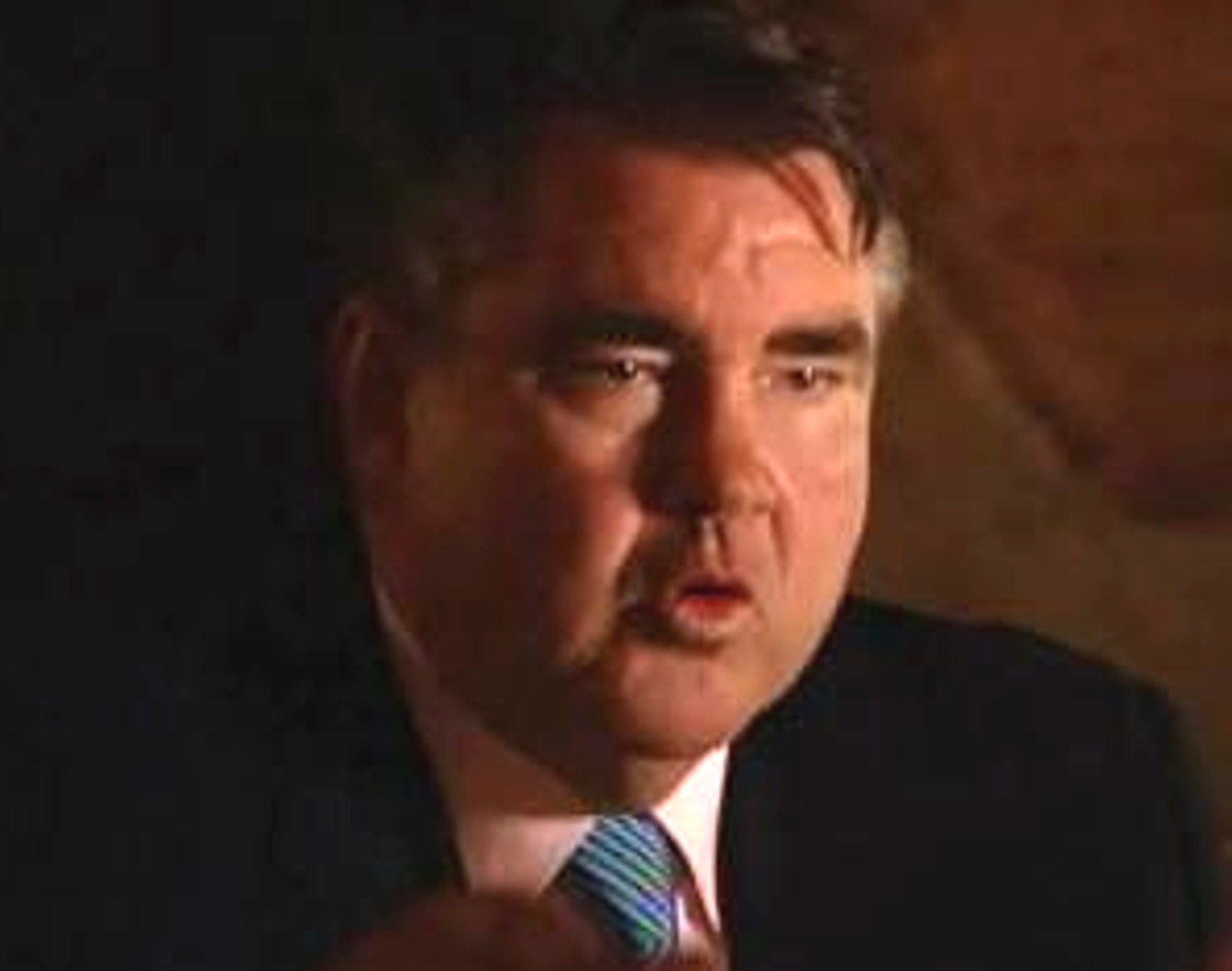
Above: CBS consultant Paul Ciolino who ran a farcical test in Perugia and also slimed prosecutor and police

Above: Indecisive CBS producer Doug Longhini who with Joe Halderman produced CBS’s two fiascos
Wednesday, October 21, 2009
John Follain’s Book And At Least One Other On Meredith’s Sad Case Due Out In January
Posted by Peter Quennell
The verdict in the case is tentatively expected around the end of the first week in December and the first of the books will be out about six weeks later.
Please expect detailed reviews of all the books here on TJMK.
Our criteria for judging all the books is really pretty simple. One, will they be accurate on all the evidence and fair to the Italian system? And two, will they tell us sympathetically much more than we already know about the wonderful person that was Meredith? Or will they simply obsess further about the two defendants?
- John Follain’s book “Death in Perugia” is now announced on Amazon here
- Paul Russell and Graham Johnson’s book “Darkness Descending” is now announced on Amazon here
Everything we know about John Follain (above), the Italy correspondent for the UK Sunday Times, from John’s past reporting on the case, from his past books, and from comments about him by those who work with him in Rome and greatly respect him, is that John is scrupulously fair, never ever sensational, and increasingly well researched on who Meredith really was.
We are still waiting to see what angle Nina Burleigh will be taking in “Cottage in Perugia” but we are hopeful. And we can probably kinda anticipate what one-note angle Candace Dempsey’s “Murder In Italy” will be taking.
Oh and this just for the record. Nearly a million people dropped by TJMK seeking to know Meredith in the past year.
Thursday, October 15, 2009
Croydon Guardian The Kerchers’ Hometown Paper Continues To Report Objectively
Posted by The Machine
Click above for the factual report. The Croydon Guardian has posted way over 100 stories and regular readers will be among the best-informed in the UK.
The Croydon Guardian was the first newspaper anywhere to mention True Justice For Meredith Kercher, which helped put TJMK on the map in November of 2008.
It is also good to see the journalist Kirsty Whalley doing what so many journalists covering the case have failed to do, namely sticking to the facts. No spin. She writes a balanced account and is not afraid to unequivocally state that Meredith’s DNA was on the blade of the knife and Raffaele Sollecito’s DNA was on Meredith’s bra clasp.
It’s no secret that Amanda Knox’ family and supporters have tried to exert a stranglehold over the media and angrily control what journalists can and cannot write. So it’s refreshing to read an article in a small local paper that hasn’t been hijacked for once by Curt Knox, Edda Mellas, Anne Bremner or Doug Preston.
Incidentally, Anne Bremner needs to prep up on Italian law after getting a basic fact wrong in a recent interview on ABC News when she claimed that the Italian legal system has eight jurors and two judges. Bremner seems to have the unfortunate habit of messing up whenever she’s interviewed about the case.
Who can forget her stridently analyzing entirely the wrong crime scene on NBC last year?
The editors of two of the newspapers in Seattle - the Seattle Post-Intelligencer and the West Seattle Herald - could also learn a thing or two from reading Kirsty’s article. The Seattle Post-Intelligencer will not now allow any of its readers to comment about the case - something that online reporter Monica Guzman was commendably unhappy about.
Italy has been portrayed as being a backward country by elements in the US media and especially by a vociferous minority in Seattle. Perhaps the people of Seattle should be more concerned about being denied the right of freedom of speech, a basic constitutional right, by one of their main newspapers.
The Seattle Post-Intelligencer’s readers deserve to know whether Amanda Knox’s family was behind the decision to ban all comments about the case. It has already been well-documented on TJMK that the Seattle-Post Intelligencer hosts a strident and highly inaccurate “reader’s blog” which has had a record of trashing poor Meredith and her silently-grieving family.
The West Seattle Herald hasn’t fared much better with bumbling reporter Steve Shay covering the case. Shay’s pieces are more like Knox family newsletters than newspaper articles. Shay landed The West Seattle Herald in hot water by making unfounded comments about Mignini, which resulted in Mignini suing the newspaper
If it relies on its own local paper, Croydon essentially knows the truth of what is going on. And Seattle unfortunately doesn’t if it relies on its own dismal reporting.

